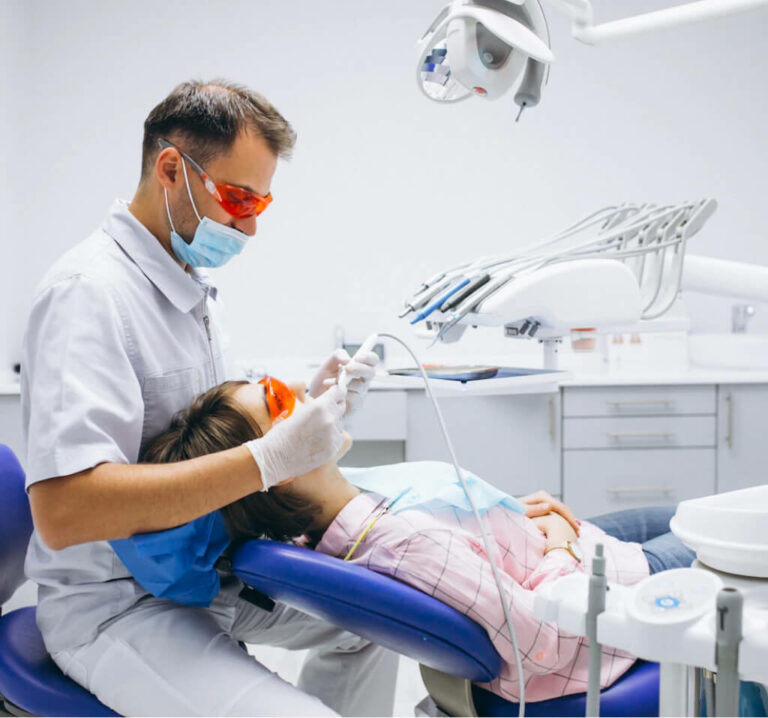
What Is Grafting Treatment?
Your jaw can grow extra bone grafting, providing structural support for dental implants. Without the grafts, there would not be enough bone for dental implants, allowing them to be secured. Our dental implants should be secured firmly and comfortably in the end.
Grafting can restore the jawbone in ways other than only supporting new implants. It can help your face regain its shape and contour if necessary. Therefore, we should do this in two stages: first, the bone transplant treatment, and then, after several months of healing, the addition of your dental implants.

The Types Of Grafting Treatment
Our Bright Dental Care And Implant Center, located in Ahmedabad, Gujarat, will provide you with two types of grafting treatment.
Bone Grafting
A bone graft may be required if you have grafting treatment, but your jaw lacks good bone tissue. The team of specialists at Bright Dental Care And Implant Center can help you build the bone tissue necessary for your dental implants by performing safe and effective bone transplant treatments for their patients. The tooth and root are more prone to infection when the exposed root surfaces are visible, uncomfortable, and unattractive.
Soft Tissue Grafting
In areas where the gums are receding, soft tissue grafting requires expanding them to cover the teeth. It is caused by the continual loss of gum tissue, which causes the gum line to recede and lengthen the tooth. The primary goals of a soft tissue grafting procedure are to cover the exposed root and enhance the quality and thickness of the pre-existing gum tissue to stop additional gum loss.

The Key Benefits Of Grafting Treatment
- Assures a higher chance of long-term success for dental implants
- Prevents the appearance of a “shrunken” face by creating a “fuller” jaw
- High success rate and a safe procedure
- Enhanced dental performance
- Enhanced attractiveness and confidence

Who We Serve?
A graft can be beneficial in several situations where bone loss may occur. The most typical causes of bone loss are as follows:
- Gum (periodontal) disease
- Osteoporosis
- Gingivitis
- Cancer
- Traumatic facial injury

Why Choose Us For Your Grafting Treatment?
Dental Implant Surgeons, Registered Specialist Dentists, Dental Nurses, and Hygienists are members of our team who are all very skilled and knowledgeable in these operations.
Everything we do revolves around the needs of the patients. As a dental practice, we strive to provide you with the desired treatment results while demonstrating a high level of knowledge, empathy, and care. Many patients who have been coming to see us for years tell us this is why they won’t go anywhere else.
Receive the best consultation for any questions about bone grafting or dental implants. We’ll be pleased to help.
FAQs
What Happens After The Procedure?
Before surgery to place the dental implants is performed, the graft will often be allowed to heal for three to six to nine months. When the surgery is finished, you can leave the office if you underwent local anaesthesia for the treatment. You will be given an antibiotic course to go home and utilise over the following week.
What Must I Accomplish Once I Get Home?
After your treatment, you should be able to return to work in a day or two. Sometimes following surgery, you might be unable to wear your dentures for up to two weeks (the dentist treating you will let you know if this is the case). For a full day, abstain from alcohol. If you smoke, we strongly advise you to stop and give up smoking permanently.
For the first week following surgery, it is not advised to brush the area where your graft was taken from or implanted. A mouthwash with chlorhexidine (like Corsodyl) is recommended to keep the site free of plaque. Two times a day, one minute of holding the mouthwash in the mouth is recommended.
Will I Have A Follow-Up Appointment?
To determine whether the bone transplant was successful and to schedule the subsequent phase of your implant treatment, you must schedule a follow-up consultation. You need to book the consultation for that day.
Any implant-based dentures or dental restorations will require regular care and follow-up. We will count on you to be available for such care and routine inspections of the implants.
